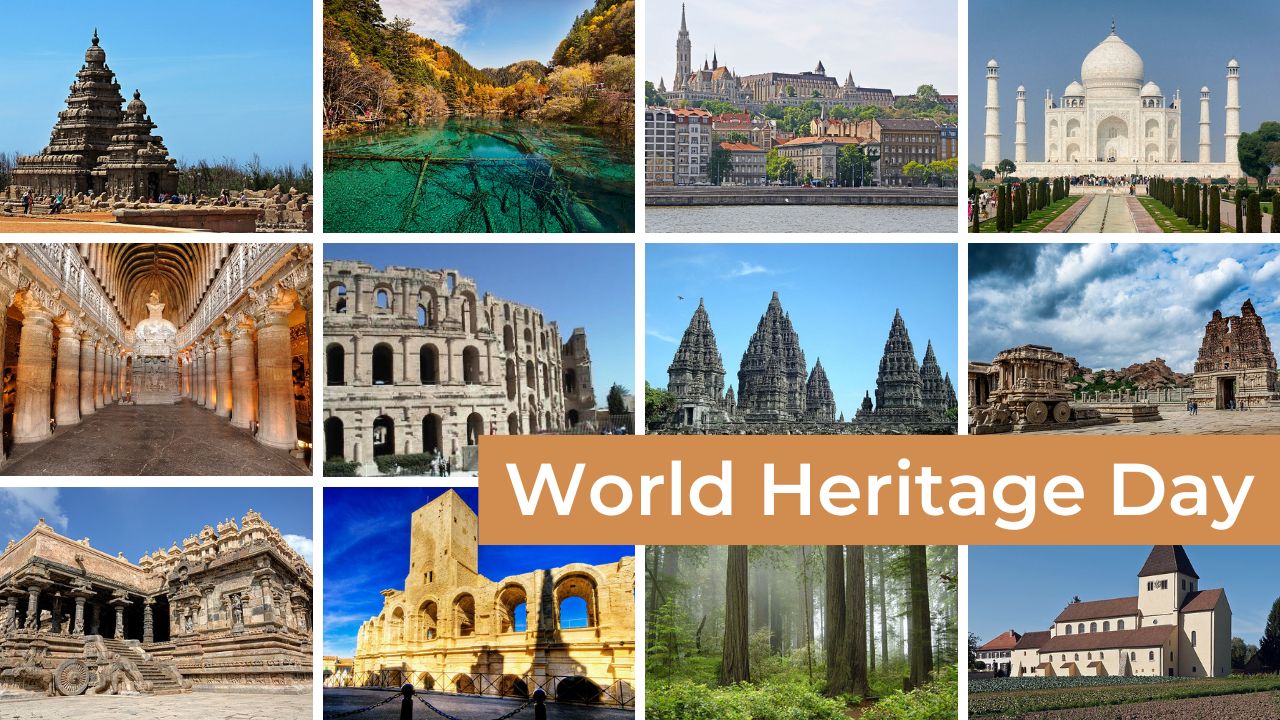World Heritage Day – History | Significance | Theme | Quotes
World Heritage Day – History | Significance | Theme | Quotes: World Heritage Day, also known as International Day for Monuments and Sites, is celebrated on April 18th every year. It is a day designated by UNESCO [United Nations Educational, Scientific and Cultural Organization] to raise awareness about the importance of preserving and protecting cultural and natural heritage sites around the world.
The aim of World Heritage Day is to promote cultural diversity, encourage appreciation of heritage sites, and foster their conservation for future generations. It serves as a reminder of the significance of heritage sites as unique and irreplaceable treasures that contribute to humanity’s collective history, identity, and cultural richness.
On World Heritage Day, various activities are organized globally to celebrate and raise awareness about heritage sites, including exhibitions, guided tours, workshops, conferences, and other cultural events. These activities highlight the value of heritage sites as important symbols of our shared past and the need to safeguard them from threats such as environmental degradation, urbanization, and conflict.
World Heritage Day also provides an opportunity to recognize the efforts of organizations, governments, and local communities in preserving and conserving heritage sites. It encourages collaboration among different stakeholders to work towards sustainable management of heritage sites, balancing the need for conservation with social and economic development.
As individuals, we can also contribute to the preservation of heritage sites by respecting their significance, promoting responsible tourism practices, and raising awareness about their importance among others. By safeguarding our heritage sites, we can ensure that future generations can continue to appreciate and learn from these precious legacies of humanity’s shared history
World Heritage Day History
The idea of World Heritage Day was proposed during the 22nd General Conference of UNESCO (United Nations Educational, Scientific and Cultural Organization) held in Paris, France, in 1983. ICOMOS suggested that a day be designated to raise awareness about the importance of cultural heritage and encourage its preservation. In 1984, UNESCO officially adopted April 18th as International Day for Monuments and Sites, and the first celebration took place in 1985.
April 18th holds special significance as it commemorates the day in 1982 when the International Charter for the Conservation and Restoration of Monuments and Sites, also known as the Venice Charter, was adopted during an ICOMOS conference in Venice, Italy. The Venice Charter is a key international document that provides guidelines for the conservation and restoration of cultural heritage sites, emphasizing the need for respecting the authenticity and integrity of heritage sites.
Since its inception, World Heritage Day has been celebrated annually on April 18th with various activities organized by governments, organizations, communities, and individuals around the world. These activities aim to raise awareness, promote appreciation, and foster the conservation of cultural and natural heritage sites, including archaeological sites, historic buildings, monuments, cultural landscapes, and natural areas of exceptional value.
World Heritage Day has become an important global event that highlights the significance of heritage sites as valuable assets for humanity and emphasizes the need for their protection and preservation for present and future generations to enjoy. It serves as a platform to promote responsible heritage stewardship and encourage collective efforts to safeguard our shared cultural and natural heritage.
World Heritage Day Significance
World Heritage Day, also known as International Day for Monuments and Sites, holds significant importance for several reasons:
1. Raising awareness about heritage sites: World Heritage Day serves as a global platform to raise awareness about the importance of cultural and natural heritage sites. It highlights the significance of these sites as valuable assets that represent our shared history, culture, and natural heritage. By promoting awareness, World Heritage Day encourages a sense of responsibility towards heritage sites and fosters a greater understanding of their value among communities, governments, and individuals.
2. Promoting cultural diversity: Heritage sites represent the diverse cultural heritage of humanity, including archaeological sites, historic buildings, monuments, cultural landscapes, and intangible cultural heritage. World Heritage Day promotes the importance of cultural diversity by recognizing and celebrating the unique characteristics of different heritage sites around the world. It encourages respect for cultural differences and promotes intercultural dialogue, understanding, and tolerance.
3. Conservation and preservation: World Heritage Day emphasizes the need for the conservation and preservation of heritage sites. It raises awareness about the threats and challenges faced by heritage sites, such as environmental degradation, urbanization, climate change, and conflict, and encourages efforts to protect and safeguard these sites for future generations. It promotes responsible tourism practices, sustainable management, and preservation techniques that respect the authenticity and integrity of heritage sites.
Collaboration and engagement: World Heritage Day encourages collaboration and engagement among various stakeholders, including governments, organizations, communities, and individuals, in the preservation of heritage sites. It fosters partnerships and cooperation at local, national, and international levels to ensure the effective management and conservation of heritage sites. It also engages local communities and indigenous peoples, recognizing their role as custodians of traditional knowledge and practices associated with heritage sites.
Education and learning: World Heritage Day promotes education and learning about heritage sites, their significance, and their conservation. It encourages educational institutions, museums, and heritage organizations to organize activities such as workshops, exhibitions, guided tours, and cultural events to promote understanding, appreciation, and knowledge about heritage sites. It emphasizes the importance of learning from the past and using heritage sites as educational resources for present and future generations.
Overall, World Heritage Day holds significant importance as it promotes awareness, appreciation, conservation, and responsible stewardship of our cultural and natural heritage, contributing to the sustainable development and well-being of communities and the world at large.
World Heritage Day Themes
World Heritage Day, also known as International Day for Monuments and Sites, does not have an official theme designated by UNESCO or ICOMOS. However, various organizations and communities around the world often choose to celebrate World Heritage Day with a specific theme each year to highlight different aspects of heritage conservation and promotion.
Here are some examples of themes that have been used in the past for World Heritage Day celebrations:
Sustainable Tourism for Heritage Conservation
Cultural Landscapes and Nature
Heritage and Communities
Heritage and Indigenous Peoples
Women in Heritage
Youth and Heritage
Climate Change and Heritage
Cultural Heritage and Education
Heritage and Urban Regeneration
Industrial Heritage
Sacred Heritage Sites
Intangible Cultural Heritage
Heritage at Risk: Protecting our Past for the Future
Celebrating Diversity in Heritage
Living Heritage: Transmitting the Values of the Past to the Future
Please note that these are examples of themes that have been used in the past and may vary from year to year and from one organization or community to another. The theme for World Heritage Day celebrations may be chosen based on local, regional, or global priorities related to heritage conservation, preservation, and promotion.
World Heritage Day Quotes
Here are some quotes that celebrate the significance of World Heritage Day and the importance of cultural and natural heritage:
“Heritage is our legacy from the past, what we live with today, and what we pass on to future generations.” – UNESCO
“The cultural heritage of a nation is not just its monuments, buildings, and artifacts, but also its traditions, customs, language, and way of life.” – Unknown
“The earth is a museum, and every country is a gallery.” – Unknown
“We do not inherit the Earth from our ancestors, we borrow it from our children.” – Native American Proverb
“A nation’s culture resides in the hearts and souls of its people.” – Mahatma Gandhi
“Heritage is our cultural capital, and its preservation is a testament to our respect for the past and our commitment to the future.” – Irina Bokova
“Cultural heritage is the fabric of our identity, the story of our past, and the foundation for our future.” – Unknown
“The best way to predict the future is to preserve the past.” – National Park Service
“Heritage is the mirror of our soul, reflecting our history, culture, and diversity.” – Unknown
“Our heritage is not just a collection of historic sites, but a living connection to our roots, our values, and our sense of belonging.” – Unknown
These quotes highlight the significance of cultural and natural heritage as a source of pride, inspiration, and identity for humanity, and the need to preserve and protect them for present and future generations to appreciate and cherish.




